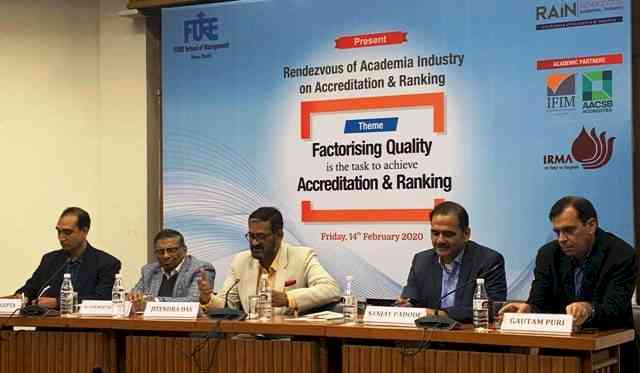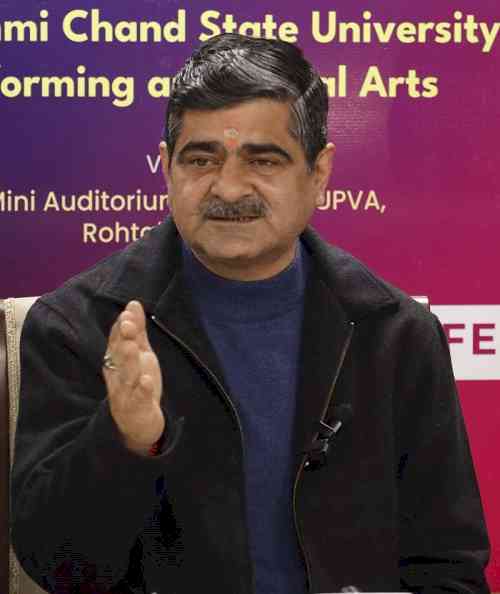Academia and experts deliberate on quality evaluation process
A symposium on “factorising quality is the task to achieve accreditation and ranking” held

New Delhi: A symposium on “factorising quality is the task to achieve accreditation and ranking” was held at India International Centre, New Delhi organized by MBA Rendezvous in association with FORE School of Management, New Delhi.
Mr. Amarjeet Singh Oberoi, Founder President, MBA Rendezvous, set the context of the symposium and welcomed panelists from academia and corporate for session on technical aspects of Ranking and Accreditation. Stressing upon quality which has to be implemented both in pedagogy and curriculum, he said “It is imperative for the institutes to be more quality driven and faculty driven towards making the curriculum ready for industry 4.0.”
Session moderator Prof. Dileep N. Malkhede, Adviser, AICTE for ‘Rubrics of Accreditation and Ranking’, who was involved with the accreditation process for 25 years, mentioned in his opening statements the importance of ranking and accreditation for institutions and their students. Referring to the NIRF ranking by the Government of India, he said it was “initially an experiment, which has evolved in the past four years and is further improving with upgraded formats, multiple parameters in various domains. This has really created competition amongst institutions”. In the past 25 years ever since accreditation system was introduced in the country, 16-17% of the institutes are having accreditations. The target for AICTE is to get 50% of academic institutes accredited.”
Citing incidents in Kuwait where employed Indian engineers were asked to leave by the employer and sent back as their respective colleges did not have accreditations, he stated how accreditation can play a very important role in placements “as it may be considered a quality benchmark by the HR department of organisations.”
Mr. A .Thothathri Raman, International Accreditation Advisor & Chairman, SEAA Trust, New Delhi, put forward a historical perspective on factorizing in practicing quality. “Compliance is what builds quality” said he and stated the importance of a frame work or road map for quality and self-regulation. The present frame work is mostly about quantity, than quality. Institutes apply for accreditations when they are confident of the compliances to be followed.
Referring to “Independence and Self-regulation system”, he said, “Large number of institutes are privately run where Government do not have much investments. At one point the ‘compliance’ or in other what words Government or Government related agencies, should stop and allow the community to take over. Innovation is possible when there is autonomy.”
Ranking denotes Quality or USP?
Mr. Ashwin Fernandes, Regional Director – Middle East, North Africa & South Asia Quacquarelli Symonds, dubbed accreditation as ‘healthy food’ and ranking to be ‘spicy healthy food’. While accreditation specifies a minimum standard for institutes to attain, rankings make institutes to aspire and aim higher. Rankings are inputs and just starting point for exploration. Across the world rankings are in the process of evolving including one at QS, based on feedback and responses from various stakeholders.
Melange of Academia 4.0 & Industry 4.0 whys & How’s?
Mr. Rajeev Karwal, Founder Chairman, Milagrow Business and Knowledge Solutions, raised pertinent question as he asked, how many institutes may have ranked their own reputation amongst employers who recruited from their institutes or how many institutes attempted to rank the satisfaction levels of the old students studying in terms of career progression.
Dr. Jitendra Das, Director, FORE School of Management, New Delhi set the context of the session ‘Vox Populi of Industry Academia on Accreditation & Ranking’, with his views on accreditations and ranking, said “Accreditation reflect the forte of the institute, while ranking tells how an institute is placed among its peers.” Referring to the fact that lot of students and parent who may not be very acquainted with accreditation, look into ranking of the institutes during the selection process, he said, “A student may not be able to choose between two institutes which may have the exactly the same accreditation where the ranking may help him select the right one. So, both complement each other”.
Methodologies followed by plethora of ranking agencies which came were either flawed or unauthentic, exceptions being the rankings done by CRISIL before NIRF came into picture which has been “a big relief”. Talking about the dissimilar regulatory policies between private B Schools and IIMs, Dr. Das cited an example of the restriction forced upon private institutes when it comes to intake of a batch size and its impact which essentially forces the private B Schools to compromise on quality.
Dr. Das proposed a ‘normalisation of the size of the institutes’ indicating the crying need for the revision of current methodology of the frameworks in which better funded and larger education institutes clearly enjoys certain benefits compared to the high performing institutes just because they are small in size.
Skills are paramount & should have synergistic effect
Mr. Vivek Jain, Chief Business Officer, Shiksha & Naukri FastForward, shared his views from the recruiter’s perspective stating ‘Skill is what recruiters search for and quality what they seek’. Recruiters often limit their search results in naukri.com to specific institutes which they feel can provide quality candidates, matching their criteria. Accreditation remains to be seen as a quality assurance process. Citing example of hiring managers recruiting students from places like NIIT or similar certification courses he said quality and industry readiness is most important for recruiter while accreditation may be just one of the factors among various others.
Mr. Anshul Kapoor, COO, MBA Rendezvous, initiative RAIN, thanked participants, delegates, key speakers while summarizing the ideas and thoughts of the session, with a promise to take it to the powers that be for consideration and amendments.



 cityairnews
cityairnews 










